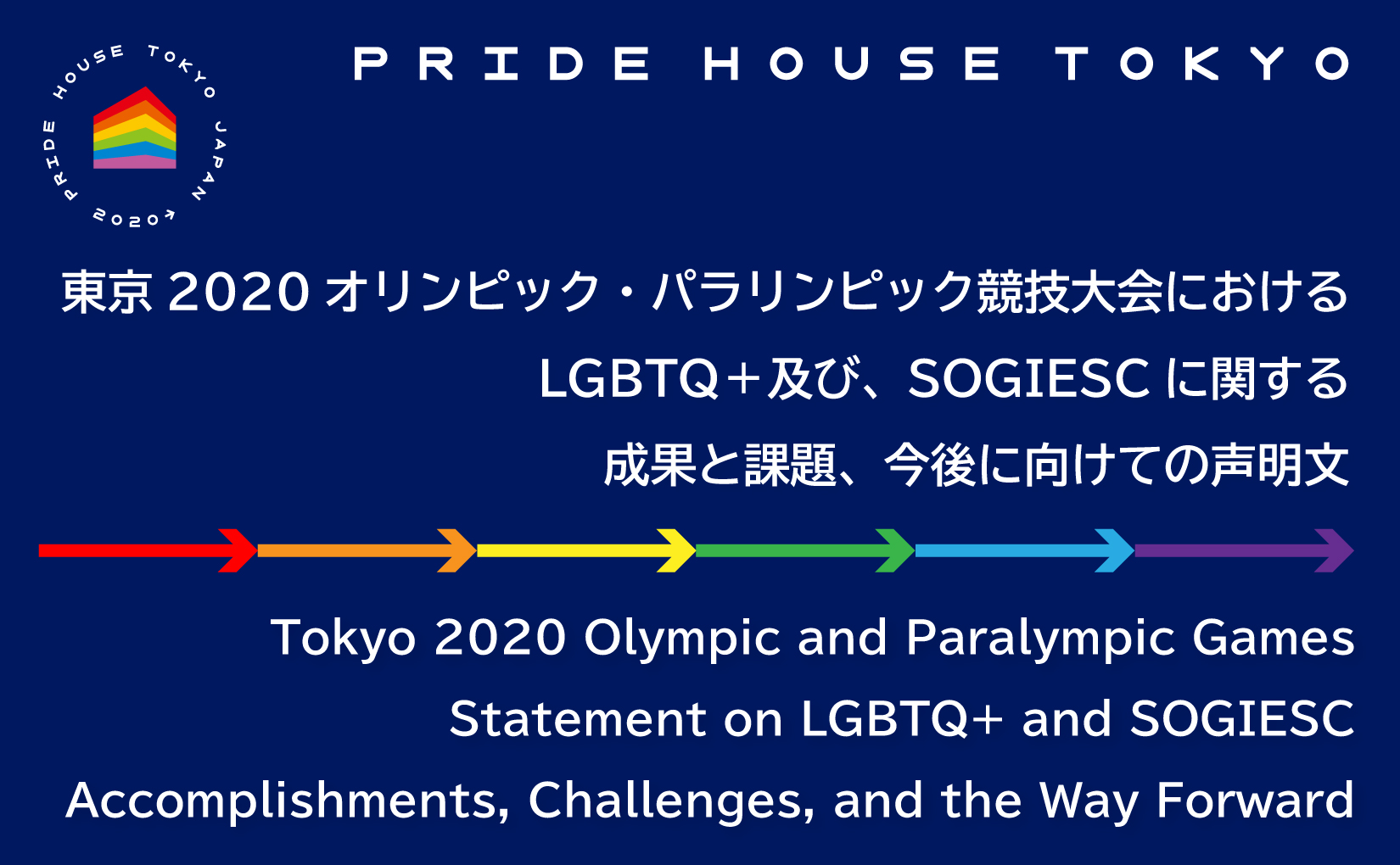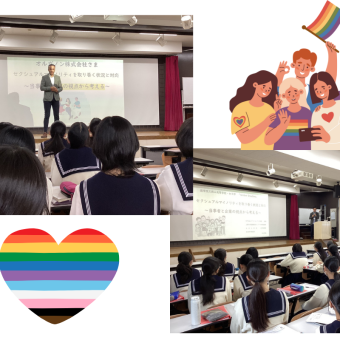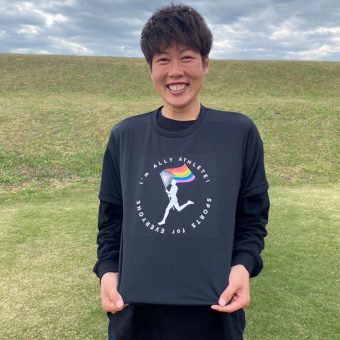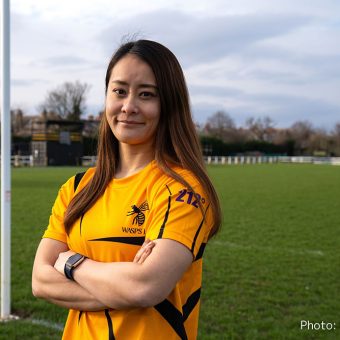News / Report
東京2020オリンピック・パラリンピック競技大会における LGBTQ+及び、SOGIESCに関する成果と課題、今後に向けての声明文 / Tokyo 2020 Olympic and Paralympic Games Statement on LGBTQ+ and SOGIESC Accomplishments, Challenges, and the Way Forward

東京2020オリンピック・パラリンピック競技大会における
LGBTQ+及び、SOGIESCに関する成果と課題、今後に向けての声明文
プライドハウス東京コンソーシアム
代表 松中権 および メンバー一同
東京2020オリンピック・パラリンピック競技大会(以下「東京2020大会」と表記)が無事、盛況のうちに幕を閉じました。世界的なコロナウイルス感染症拡大の影響のために1年の延期を余儀なくされた本大会において、選手の皆さま、指導者・スタッフを含むチーム関係者の皆さま、そして大会関係者の皆さまには想像を超える多大なご苦労があったことと思います。安全で安心な大会の実現に向けてご尽力されたすべての皆さまに、お礼と感謝を申し上げます。
さて、2018年9月のプロジェクト立ち上げ以来、プライドハウス東京は、東京2020大会を契機としたスポーツ界におけるLGBTQ+(プラス)の理解を促進するとともに、スポーツに関わる各ステークホルダーやアスリートの皆さまと、誰も排除されないLGBTQ+インクルーシブな社会づくりに向けて、3年間活動してきました。3つの基本コンセプトの1つとして「多様性と調和」が掲げられた東京2020大会は、LGBTQ+及び、SOGIESC(Sexual Orientation, Gender Identity and Expression, and Sex Characteristics : 性的指向、性自認、性別表現、身体構造における性的特徴)について、多くの議論と対話が生まれた大会となりました。より良い社会に向けた活動がひろがることを願い、プライドハウス東京は、LGBTQ+及び、SOGIESCの観点から、東京2020大会における「前向きな成果」「可視化された課題」「今後に向けての提案」を含めた本声明文を発表するに至りました。
1.前向きな成果
<東京都>
・2018年10月より東京都では、性自認及び性的指向を理由とする不当な差別の禁止が盛り込まれた「東京都オリンピック憲章にうたわれる人権尊重の理念の実現を目指す条例」が施行された。
<東京2020大会組織委員会(TOCOG)・日本オリンピック委員会(JOC)>
・「東京 2020 オリンピック・パラリンピック競技大会 持続可能性に配慮した調達コード」に性的少数者(LGBT等)への人権尊重が明記された。
・東京2020大会組織委員会内にジェンダー平等推進チームが発足した。
・東京2020大会組織委員会 橋本聖子会長がプライドハウス東京レガシーに来訪した。
・日本オリンピック委員会初となるトランスジェンダーを公表する理事として杉山文野氏が就任し、女性理事の割合も4割を超えた。
・日本オリンピック委員会 山下泰裕会長がプライドハウス東京レガシーに来訪した。
<国際オリンピック委員会(IOC)>
・IOCが報道関係者向けに「ジェンダー平等、公平性の確保のためのポートレイヤル(表象)ガイドライン」を配布した。
・IOCメディアブリーフィングにおいて、トランスジェンダーアスリートの取り扱いについて議論となった。
<東京2020競技大会>
・過去最多の少なくとも185名のLGBTQ+を公表するアスリートが東京2020オリンピック競技大会に出場した(8月5日時点のOutsportsの独自調査を参照 ※リオ2016大会では56名)。
・過去最多の少なくとも36名のLGBTQ+を公表するアスリートが東京2020パラリンピック競技大会に出場した(9月4日時点のOutsportsの独自調査を参照 ※リオ2016大会では12名)。
・3名のトランスジェンダーを公表するアスリートが大会に選手登録をした。トランスジェンダーを公表するアスリートの参加は今大会が初めてとなった(ローレル・ハバード選手:ニュージーランド、クイン選手:カナダ、チェルシー・ウルフ選手:アメリカ)。
・初めてトランスジェンダーを公表するアスリートが自身の自認する性別カテゴリーでの出場が実現した(ローレル・ハバード選手:ニュージーランド)。
・トランスジェンダーを公表するアスリートが初めて金メダルを獲得した(クイン選手:カナダ)。
・大会期間中におけるLGBTQ+アスリートからのポジティブな発信がなされた(例:ト―マス・デーリー選手:イギリスなど)。
・東京2020オリンピック競技大会の登録選手約11,000人の内、女性カテゴリーに登録した選手は49%であり、史上初の「ジェンダーバランスの取れた」大会となった(リオ2016大会では45%)。
・パラリンピック競技大会において、参加者の少なくとも40.5%が女性カテゴリーに出場し、2016年のリオ大会よりも女性カテゴリーで出場した選手が100人ほど増加した。
・これまで主に男性アスリートが務めてきた開会式の旗手を男女ペアで行った。
・オリンピック競技大会の開会式において、国歌斉唱をしたアーティストが性の多様性の象徴であるレインボーのドレスを着用した。
・オリンピック競技大会の閉会式のエンディングにおいて、リナ・サワヤマ氏の楽曲「Chosen Family(with Elton John)」が使われた。歌詞の中に「遺伝子や名字が一緒じゃなくていい」など、多様な家族の在り方を尊重し祝福する表現がみられた。
・パラリンピック競技大会の開会式において、LGBTQ+を公表するパフォーマーが起用された。
<プライドハウス東京>
・プライドハウス東京がプライドハウスの歴史上、初めてオリンピック・パラリンピック競技大会の公認プログラムとなり、様々な情報発信を行った。
・LGBTQ+の支援団体(プライドハウス東京、グラード、アスリート・アライ)が報道関係者向けに、「東京2020オリンピック・パラリンピック競技大会におけるLGBTQ+アスリートに関するメディアガイドライン」を発表した。
・東京2020競技大会組織委員会の職員向けのLGBTQ+に関する研修、ヒューマンライブラリーの実施、D&Iハンドブックの監修を行った。
・東京2020競技大会組織委員会の「大会スタッフ・都市ボランティアのユニフォームデザイン選考委員会」の外部アドバイザー、「Technical Official(審判・技術役員)フォーマルウェア」アドバイザー、「人権労働・参加協働ワーキンググループ」の委員を代表松中が務めた。
・オリンピック・パラリンピックの公式プラカードベアラー向けのD&I研修(主催:日本コカ•コーラ)、各種ボランティア向けのLGBTQ+研修(主催:日本財団ボランティアサポートセンター)、ホストタウン向けのLGBTQ+研修(主催:内閣府)にて講師を務めた。
2.可視化された課題
<法整備>
・オリンピック・パラリンピック開催国の日本において、性的指向や性自認に基づく差別を禁止する法律が制定されていないままである。また、同性婚や選択的夫婦別姓も未だに認められていない。
<社会環境>
・トランスジェンダーを公表するアスリートが自認する性別カテゴリーで出場することへの批判や、選手への非難が多く寄せられた。
<スポーツ界の風土>
・オリンピック・パラリンピック合わせて221名(Outsports調べ)のLGBTQ+を公表するアスリートが大会に出場したにも関わらず、大部分は、北米・西ヨーロッパの代表選手であり、日中韓の東アジア3か国の選手の中にはLGBTQ+を公表するアスリートの参加がみられず、地域や文化的な偏りが顕著にみられた。
・男性カテゴリーに出場する選手の中でLGBTQ+を公表するアスリートは女性カテゴリーに出場する選手よりもはるかに少なく、スポーツにおけるカミングアウトの障壁にジェンダー差が顕著にみられた。
<東京2020競技大会組織委員会・大会運営>
・東京2020大会組織委員会 森喜朗会長(当時)から、大会開幕の数カ月前に性差別的な発言があった。
・国会議員によるLGBTQ+当事者への差別発言を擁護した作曲家・すぎやまこういち氏の楽曲がオリンピック競技大会の開会式に起用された。
・東京2020大会開幕の直前に、開会式の楽曲制作を担当していた小山田圭吾氏が学生時代に障害のある生徒らに対して虐待行為を行っていたことが発覚した。
・全ての競技会場にて、「レディース・アンド・ジェントルメン(Ladies & Gentlemen)」のアナウンスがなされ、性別二元論(バイナリー)が強調された。
・性分化による多様な発達(Differences of Sex Development:DSD)を有するアスリートの女性カテゴリーへの出場資格を規定するために採用された調査結果が、東京2020大会後に十分に妥当性のある調査結果ではなかったことが発表された。今大会の出場資格の規定のために、自身の専門とする競技での出場資格を得られない選手がいた。
・東京のオリンピック選手村に滞在する何名かのアスリートの性的指向に関連する個人情報が、本人の許可なくSNS上にて暴露される「アウティング行為」が発生した。
3.今後に向けての提案
以上のように、東京2020大会は、ジェンダー平等、LGBTQ+やSOGIEに関する多くの対話が生まれるなど歴史的な大会となった一方で、多くの課題も明らかになりました。
日本のスポーツ界において生まれた、小さな、しかし、確実なLGBTQ+のムーブメントを東京2020大会後も絶やさぬように、プライドハウス東京としては今後も継続したアクションを行うこで課題解決に努めてまいります。
2020年10月、新宿御苑駅前に開設した常設のLGBTQ+センター「プライドハウス東京レガシー」では引き続き、LGBTQ+に関するポジティブな情報発信や、居場所の提供、相談支援プログラムを行うなど、国内スポーツ競技団体、関係者や指導者と連携してまいります。
目前に控えた、2022年北京冬季オリンピック・パラリンピック競技大会においては、現地の団体や専門家とコレクティブ・インパクト型の取り組みを通した経験と学びを共有し、大会組織委員会、国際オリンピック委員会と連携してLGBTQ+アスリートを守りサポートしていく可能性を探る所存です。また、2024年パリ夏季オリンピック・パラリンピック競技大会をはじめ、今後、大規模国際競技大会が行われる際も同じく様々なステークホルダーとの連携を積極的に推進することで、全てのアスリートが安全・安心に競技に参加できるスポーツ界を目指します。
そして、スポーツ界だけに留まらず、今後も国内外のあらゆるステークホルダーと連携しながら、誰も排除されない LGBTQ+インクルーシブな日本社会を実現できるよう邁進してまいります。
引き続きご支援・ご協力のほど、よろしくお願いいたします。
———————
Tokyo 2020 Olympic and Paralympic Games
Statement on LGBTQ+ and SOGIESC Accomplishments, Challenges, and the Way Forward
Pride House Tokyo Consortium
Representative: Gon Matsunaka and all Consortium members
The Tokyo 2020 Olympic and Paralympic Games (hereinafter referred to as the “Tokyo 2020 Games”) have come to a successful conclusion. After a year’s postponement due to the coronavirus pandemic, I am sure that the athletes, coaches, staff and other team members, as well as everyone involved in the Tokyo 2020 Games, have endured more hardships than they could have imagined. I would like to express my gratitude and appreciation to all those who worked so hard to make the tournament safe and secure.
Since the launch of the Pride House project in September 2018, Pride House Tokyo has been working with sports stakeholders and athletes for the last three years to promote understanding of LGBTQ+ in sports and to create an LGBTQ+ inclusive society. The Tokyo 2020 Games had “diversity and harmony” as one of their three basic concepts. These concepts were able to create great opportunities for discussion and dialogue about LGBTQ+ and SOGIESC (Sexual Orientation, Gender Identity and Expression, and Sex Characteristics). It is in that spirit and in the hope of creating a better society that Pride House Tokyo has decided to release a statement pointing out the “Accomplishments”, “Challenges”, and “Way Forward” from the perspective of LGBTQ+ and SOGIESC at the Tokyo 2020 Games.
1.Accomplishments
<Tokyo Metropolitan Government>
・On October 2018, the Tokyo Metropolitan Government enacted the “Tokyo Metropolitan Ordinance Aiming to Realize the Principle of Respect for Human Rights enshrined in the Olympic Charter,” which included a prohibition of unfair discrimination on the basis of gender identity and sexual orientation.
<Tokyo 2020 Organizing Committee (TOCOG) & Japan Olympic Committee (JOC)>
・”Respect for the human rights of sexual minorities (LGBT, etc.)” was clearly stated in the Tokyo 2020 Olympic and Paralympic Games Sustainability Procurement Code.
・A “Gender Equality Promotion” team was established within the Tokyo 2020 Organizing Committee.
・Seiko Hashimoto, President of the Tokyo 2020 Organizing Committee, visited Pride House Tokyo Legacy.
・Fumino Sugiyama was appointed as the first openly transgender board member of the Japanese Olympic Committee, and the percentage of female board members was boosted to over 40%.
・Yasuhiro Yamashita, President of the Japanese Olympic Committee, visited Pride House Tokyo Legacy.
<International Olympic Committee(IOC)>
・The IOC distributed “Portrayal Guidelines for Gender Equality and Fairness” to the media.
・During the IOC media briefing, the treatment of transgender athletes was discussed.
<Tokyo 2020 Game>
・A record number of at least 185 openly LGBTQ+ athletes competed in the Tokyo 2020 Olympic Games (according to Outsports’ research as of Aug. 5. Similarly there were 56 out athletes at the Rio 2016 Games).
・A record number of at least 36 openly LGBTQ+ athletes competed in the Tokyo 2020 Paralympic Games (According to Outsports’ as of September 4, Similarly there were 12 out athletes at the Rio 2016 Games).
・There were three openly transgender athletes registered as athletes for the Games. This was the first time for transgender athletes to participate in the Games (Laurel Hubbard: New Zealand, Quinn: Canada, Chelsea Wolfe: USA).
・For the first time, an openly transgender athlete was able to compete in the gender category in which she identified (Laurel Hubbard, New Zealand).
・For the first time, an openly transgender athlete won a gold medal (Quinn, Canada).
・There were many positive messages from LGBTQ+ athletes during the Games (e.g. Tom Daley: Great Britain et al).
・Of the approximately 11,000 athletes registered for the Tokyo 2020 Olympic Games, 49% were registered in the women’s category, making it the first “gender-balanced” Games in history (compared to 45% in Rio 2016).
・At least 40.5 percent of participants competed in the women’s category at the Paralympic Games, an increase of about 100 athletes who competed in the women’s category in Rio.
・Pairs of both men and women served as flag bearers for the opening ceremonies, which had previously been mainly held by male athletes.
・During the opening ceremony of the Olympic Games, the artist who sang the national anthem wore a rainbow dress, a symbol of gender diversity.
・The song “Chosen Family” by Rina Sawayama (with Elton John) was used as the closing song of the Olympic Games. The lyrics of the song included phrases such as,“We don’t need to share genes or a surname,” celebrating the diversity of families.
LGBTQ+ performers were used in the opening ceremony of the Paralympic Games.
<Pride House Tokyo>
・For the first time in the Pride House’s history, Pride House Tokyo became part of the official program of an Olympic and Paralympic Games, disseminating information during the Games.
・The LGBTQ+ support groups (Pride House Tokyo, Grad, Athletes Ally) released “Media Guidelines for LGBTQ+ Athletes at the Tokyo 2020 Olympic and Paralympic Games” for media and press.
・Pride House Tokyo conducted LGBTQ+ diversity training, held “Human Library” sessions, and supervised the D&I Handbook for Tokyo 2020 Games Organizing Committee staff.
・Pride House Tokyo representative Gon Matsunaka served as an external advisor to the Tokyo 2020 Games Organizing Committee’s “Uniform Design Selection Committee for Games Staff and Urban Volunteers,” as an advisor on “Technical Official Formal Wear,” and a member of the “Working Group on Human Rights, Labor and Participation.”
・He also served as a lecturer during the D&I training for official Olympic and Paralympic placard bearers (hosted by Coca-Cola Japan), at various LGBTQ+ training sessions for volunteers (hosted by the Nippon Foundation Volunteer Support Center), and LGBTQ+ training for host towns (hosted by the Cabinet Office).
2.Challenges
<Legislation>
・Japan, the host country of the Olympic and Paralympic Games, still has not enacted laws prohibiting discrimination based on sexual orientation and gender identity. Additionally, same-sex marriage and the optional use of separate surnames for married couples remains unrecognized.
<Cultural environment>
・The fact that openly trangender athletes were able to compete in their self-identified gender category came under a lot of criticism, as did the athletes themselves.
<Sporting culture>
・Despite the fact that 221 LGBTQ+ athletes (according to Outsports) competed in both the Olympic and Paralympic Games, the majority of them represented North America and Western Europe, with no LGBTQ+ athletes from the three East Asian countries of Japan, China, and Korea. A regional and cultural bias was very evident.
・Among athletes competing in the male category, there were far fewer athletes who came out as LGBTQ+ than those competing in the female category, and there were significant gender differences in barriers to coming out in sports.
<Tokyo 2020 Games Organizing Committee and Games Management>
・Sexist remarks were made by the then Tokyo 2020 Organizing Committee Chairman Yoshiro Mori months before the opening of the Games.
・A song composed by Koichi Sugiyama, who was known to have defended discriminatory remarks made by a member of the Diet against LGBTQ+ people, was used for the opening ceremony of the Olympic Games.
・Just before the opening of the Tokyo 2020 Games, it was revealed that Keigo Oyamada, who was in charge of producing the music for the opening ceremony, had abused students with disabilities when he was a student.
・The announcement of “Ladies & Gentlemen” was made in all competition venues, emphasizing a binary gender.
・The announcement after Tokyo 2020 that the research adopted to define the eligibility of athletes with Differences of Sex Development (DSD) to compete in the women’s category was sufficiently validated, meant that due to the rules of eligibility for this year’s games, some athletes would not able to qualify for the games in their own specialty.
・Personal information related to the sexual orientation of some athletes staying at the Olympic Village in Tokyo was revealed on social networking sites without their permission, an act known as “outing.
3.Way Forward
As mentioned above, the Tokyo 2020 Games have been a historic event, with many important discussions centering around gender equality, LGBTQ+ and SOGIE, but it has also revealed many future challenges lay ahead. Pride House Tokyo will continue to take action to ensure that the small but steady LGBTQ+ movement that has emerged in Japanese sports continues after the Tokyo 2020 Games.
In October 2020, Pride House Tokyo Legacy, a permanent LGBTQ+ center opened close to Shinjuku Gyoen Station. The center will continue to disseminate positive information about LGBTQ+, provide a place for LGBTQ+, offer counseling and support programs, and collaborate with domestic sports organizations, officials, and leaders after the Games.
With the upcoming Beijing Winter Olympic and Paralympic Games in 2022, we hope to share our experiences and what we learned through collective impact initiatives with local organizations and experts, and explore the possibility of working with the Games’ Organizing Committee and the International Olympic Committee to protect and support LGBTQ+ athletes. We will also be exploring the possibility of protecting and supporting LGBTQ+ athletes in collaboration with the Games Organizing Committee and the International Olympic Committee. Addition, we are looking ahead too to the Paris 2024 Summer Olympic and Paralympic Games and other large-scale international sporting events in the future. We will be actively promoting collaboration with various stakeholders there too, with the aim of creating a sporting world where all athletes can participate in competitions safely and securely.
We are also looking beyond the sporting world to work with all stakeholders, both in Japan and overseas, to realize an LGBTQ+ inclusive Japanese society.
For that end, we ask for your continued support and cooperation. Thank you very much
関連
ニュース/
レポート
-
レポート

國學院大學久我山高等学校・女子部~オルガノン株式会社さまと協働プロジェクトを実施 ~多様性を尊重し、共生社会を目指すために
協賛企業のオルガノン株式会社さまのご協力を得て、國學院大學久我山高等学校・女子部で出張授業を実施しました。 当日はオルガノン株式会社の代表取締役社長アルパ アルプテキン様、ボランティ...
-
レポート

【アライアスリート・インタビュー③】男でも女でもない、ただ「齊藤夕眞」として。 Qを公表したサッカー選手が歩んだ自分らしさへの道のり
プライドハウス東京(PHT)では、2022年より、「アライアスリート」の輪を広げる活動に取り組んでいます。アライ(ally)とは、「同盟、味方」などを表す言葉。LGBTQ+当事者の味方としてともに...
-
レポート

【アライアスリート・インタビュー①】スポーツの力で、誰もが自分らしい居場所を持てる社会に。元ラグビー日本代表・鈴木彩香の想い
プライドハウス東京(PHT)では、2022年より、「アライアスリート」の輪を広げる活動に取り組んでいます。アライ(ally)とは、「同盟、味方」などを表す言葉。LGBTQ+当事者の味方としてともに...

